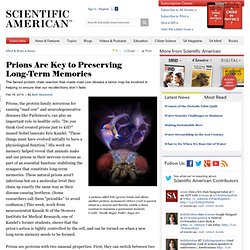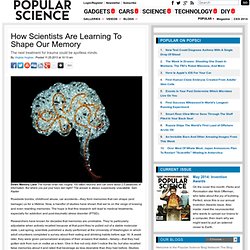

How to reduce the pain of a bad memory. Prions Are Key to Preserving Long Term Memories. Prions, the protein family notorious for causing "mad cow" and neurodegenerative diseases like Parkinson's, can play an important role in healthy cells.

"Do you think God created prions just to kill? " mused Nobel laureate Eric Kandel. "These things must have evolved initially to have a physiological function. " His work on memory helped reveal that animals make and use prions in their nervous systems as part of an essential function: stabilizing the synapses that constitute long-term memories. These natural prions aren't infectious but on a molecular level they chain up exactly the same way as their disease-causing brethren. Can we erase memories entirely? A Nasal Spray Promises to Prevent PTSD. First responders arrive at a disaster scene—a bombing, say—and, after stabilizing victims, treat them with a puff of a nasal spray to prevent post-traumatic stress disorder (PTSD).

The spray sends neuropeptide Y (NPY), a tiny but powerful signaling protein, deep into the nose and up into the brain. There it prevents the brain's stress system from kicking into overdrive and causing PTSD, which disrupts sleep, mood and thought in some people following trauma. The idea for this futuristic prophylactic treatment comes from recent studies in rats by neuroscientist Esther Louise Sabban of New York Medical College. Sabban and her colleagues dosed rats with a nasal spray containing either NPY or saline and then exposed them to a one-time series of traumatic stresses, such as being immobilized and later forced to swim in a Plexiglas tube. Seven days later the researchers tested whether the rats exhibited anxious and depressionlike behaviors.
Early memories slip away around age 7. Although infants use their memories to learn new information, few adults can remember events in their lives that happened prior to the age of three.

Psychologists have now documented that age seven is when these earliest memories tend to fade into oblivion, a phenomenon known as “childhood amnesia.” The journal Memory published the research, which involved interviewing children about past events in their lives, starting at age three. Different subsets of the group of children were then tested for recall of these events at ages five, six, seven, eight, and nine. “Our study is the first empirical demonstration of the onset of childhood amnesia,” says Emory University psychologist Patricia Bauer, who led the study. “We actually recorded the memories of children, and then we followed them into the future to track when they forgot these memories.” The study’s co-author is Marina Larkina, a manager of research projects for the psychology department.
Modifying DNA May Wipe Away Old Memories. A clean slate—that’s what people suffering from posttraumatic stress disorder (PTSD) crave most with their memories.

Psychotherapy is more effective at muting more recent traumatic events than those from long ago, but a new study in mice shows that modifying the molecules that attach to our DNA may offer a route to quashing painful memories in both cases. One of the most effective treatments for PTSD is exposure psychotherapy. A behavioral psychologist asks a patient to recall and confront a traumatic event; each time the traumatic memory is revisited, it becomes susceptible to editing through a phenomenon known as memory reconsolidation. As the person relives, for example, a car crash, the details of the event—such as the color and make of the vehicle—gradually uncouple from the anxiety, reducing the likelihood of a panic attack the next time the patient sees, say, a red Mazda. Yet this therapy works only for recent memories. Zapping the brain can help to spot-clean nasty memories.
David Lee/Focus Features/The Kobal Collection The ability to erase memory may jump from the realm of film fantasy (such as Eternal Sunshine of the Spotless Mind, shown here) to reality.

In the film Eternal Sunshine of the Spotless Mind, unhappy lovers undergo an experimental brain treatment to erase all memories of each other from their minds. No such fix exists for real-life couples, but researchers report today in Nature Neuroscience that a targeted medical intervention helps to reduce specific negative memories in patients who are depressed1.
How Scientists Are Learning To Shape Our Memory. Roadside bombs, childhood abuse, car accidents—they form memories that can shape (and damage) us for a lifetime.

Now, a handful of studies have shown that we’re on the verge of erasing and even rewriting memories. The hope is that this research will lead to medical treatments, especially for addiction and post-traumatic stress disorder (PTSD). Researchers have known for decades that memories are unreliable. How Many of Your Memories Are Fake? - Erika Hayasaki. One afternoon in February 2011, seven researchers at the University of California, Irvine sat around a long table facing Frank Healy, a bright-eyed 50-year-old visitor from South Jersey, taking turns quizzing him on his extraordinary memory.

Observing from outside of the circle, I tape-recorded the conversation as one researcher tossed out a date at random: December 17, 1999. “Okay,” Healy replied, “Well, December 17, 1999, the jazz great, Grover Washington Jr., died while playing in a concert.” “What did you eat that morning for breakfast?” “Special K for breakfast. Liverwurst and cheese for lunch. These are the kinds of specific details that writers of memoir, history, and journalism yearn for when combing through memories to tell true stories.
Why some memories last and others fade. We are more likely to form lasting memories when there is coordinated activity between two specific brain regions, MRI scans show.

“When memories are supported by greater coordination between different parts of the brain, it’s a sign that they are going to last longer,” says Lila Davachi, an associate professor in the Department of Psychology and Center for Neural Science at New York University. It is commonly understood that the key to memory consolidation—the cementing of an experience or information in our brain—is signaling from the brain’s hippocampus across different cortical areas. Moreover, it has been hypothesized, but never proven, that the greater the distribution of signaling, the stronger the memory takes hold in our brain. Making Memories, One Lie at a Time - SPONSORED CONTENT presented by University of California. How certain are you that your memories are real?
That question drives the research of Elizabeth Loftus, a professor of psychology and law at University of California, Irvine. Loftus has devoted her career to the study of memory: How it’s formed, how it’s stored, how it can be altered—and how it can be fabricated. And her findings might surprise anyone who’s convinced that their memories are infallible. After receiving her Ph.D., Loftus was awarded a grant from the Department of Transportation to study car accidents. Drugs That May Cause Memory Loss Side Effect. How they can cause memory loss: Benzodiazepines dampen activity in key parts of the brain, including those involved in the transfer of events from short-term to long-term memory.

Indeed, benzodiazepines are used in anesthesia for this very reason. When they're added to the anesthesiologist's cocktail of meds, patients rarely remember any unpleasantness from a procedure. Midazolam (Versed) has particularly marked amnesic properties. Alternatives: Benzodiazepines should be prescribed only rarely in older adults, in my judgment, and then only for short periods of time. It takes older people much longer than younger people to flush these drugs out of their bodies, and the ensuing buildup puts older adults at higher risk for not just memory loss, but delirium, falls, fractures and motor vehicle accidents. Be sure to consult your health care professional before stopping or reducing the dosage of any benzodiazepine. Making Memories, One Lie at a Time - SPONSORED CONTENT presented by University of California.
Sleep boosts brain's self-cleaning system - health - 17 October 2013. A good night's sleep may literally clear the mind.

The brain's molecular waste-disposal system – discovered last year – is most active when we are slumbering, a study in mice suggests. This adds to our understanding of the purpose of sleep and could inspire treatments for Alzheimer's, Parkinson's, and other neurological diseases linked to protein build-up in the brain. First evidence that fear memories can be reduced during sleep. A fear memory was reduced in people by exposing them to the memory over and over again while they slept.
It's the first time that emotional memory has been manipulated in humans during sleep, report Northwestern Medicine scientists. The finding potentially offers a new way to enhance the typical daytime treatment of phobias through exposure therapy by adding a nighttime component. Exposure therapy is a common treatment for phobia and involves a gradual exposure to the feared object or situation until the fear is extinguished. "It's a novel finding," said Katherina Hauner, a postdoctoral fellow in neurology at Northwestern University Feinberg School of Medicine.
"We showed a small but significant decrease in fear. Hauner did the research in the lab of Jay Gottfried, associate professor of neurology at Feinberg and senior author of the paper. The study will be published Sept. 22 in the journal Nature Neuroscience. Are search engines and the Internet hurting human memory? The following is excerpted from Clive Thompson’s book Smarter Than You Think: How Technology Is Changing Our Minds for the Better, out now from the Penguin Press. Is the Internet ruining our ability to remember facts?
If you’ve ever lunged for your smartphone during a bar argument (“one-hit father of twerking pop star”—Billy Ray Cyrus!) , then you’ve no doubt felt the nagging fear that your in-brain memory is slowly draining away. Scientists create false memories by manipulating neurons. Research may one day lead to better understanding of consciousness… Imagine you’re a mouse, and you’re feeling a chill throughout your body because a researcher is placing you into a chamber. You distinctly remember feeling shocks in that chamber… What you don't know, is that scientists have manipulated your memory by changing the normal instructions to your brain cells that drives the mind to order actions, giving you a false version of your own past. Possibility of selectively erasing unwanted memories. The human brain is exquisitely adept at linking seemingly random details into a cohesive memory that can trigger myriad associations -- some good, some not so good.
For recovering addicts and individuals suffering from post-traumatic stress disorder (PTSD), unwanted memories can be devastating. Former meth addicts, for instance, report intense drug cravings triggered by associations with cigarettes, money, even gum (used to relieve dry mouth), pushing them back into the addiction they so desperately want to leave. Now, for the first time, scientists from the Florida campus of The Scripps Research Institute (TSRI) have been able to erase dangerous drug-associated memories in mice and rats without affecting other more benign memories.
The surprising discovery, published this week online ahead of print by the journal Biological Psychiatry, points to a clear and workable method to disrupt unwanted memories while leaving the rest intact. Changing the Structure of Memory. Total Recall Here We Come: Scientists Can Now Erase Bad Memories. Elizabeth Loftus interview: False-memory research on eyewitnesses, child abuse recovered memories. Reminiscence Bumps: Music Makes Autobiographical Memories For Young People.
Music makes people nostalgic, it has long been said that music can bring us back to specific points in time. Young adults surveyed recently are even fond of and have an emotional connection to the music that was popular for their parents' generation, says a new psychology paper. While songs that were popular in our early 20s seem to have the greatest lasting emotional impact, music that was popular during our parents' younger days- and likely what they played around kids - also evokes vivid memories.
Scientists Plant False Memories in Mice. This story was originally published by Inside Science News Service. How Our Brains Make Memories. Sitting at a sidewalk café in Montreal on a sunny morning, Karim Nader recalls the day eight years earlier when two planes slammed into the twin towers of the World Trade Center. Scientists create new memories by directly changing the brain.